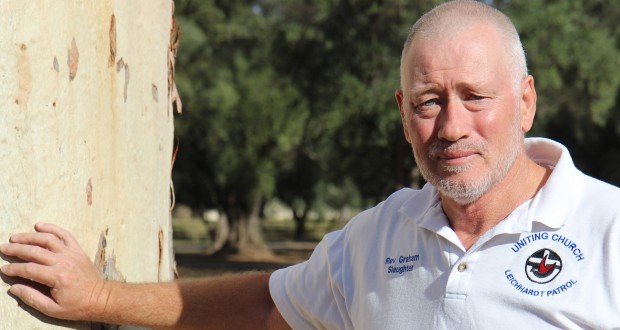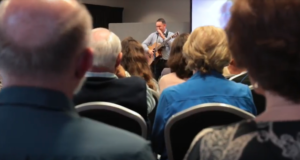As coal seam gas mining spreads across rural Queensland, landholders are feeling the stress. Bruce Mullan reports.
A third generation farmer from the Darling Downs looks across the land his grandfather cleared of brigalow scrub in 1908 to see his precious intensive grazing acres cut by roads, pipelines, open trenches and coal seam gas (GSG) mining development.
The Chinchilla farmer, who asked not to be named because he is in negotiation with lawyers and a mining company, is worried about his immediate and long-term future.
“I’m quite a bit past my retirement age and no one knows if these farms are going to sell with gas wells on them or not,” he said.
“I’ve talked to the Valuer General and he said, ‘We can’t give a value on the farms with the wells on because there haven’t been enough sales and we don’t know.’”
The long list of anxieties he shared also included water quality, salt, chemicals, interruption to his grazing business, noise and the visual ugliness of gas wells just 600 metres from his house.
“It’s a big imposition on our time and there is a mental imposition as you’re thinking about it all the time,” he said.
Creating space
In response to tensions in their community around coal seam gas mining, the Presbytery of the Downs has appealed to the Queensland Government to call a temporary halt to gas exploration permits and production licences, citing concerns about safety, fairness and a lack of conclusive evidence about the environmental impact.
Presbytery minister Sharon Kirk said the proposed moratorium would allow all stakeholders to assess the situation.
“We’re not taking sides; our churches contain people who are employed by the mining industry and those who are on the land and in rural communities,” says Sharon.
“We simply want to create a space where we can get the facts on the table, assess the real impacts and get all sides of the debate talking with each other.”
While acknowledging that mining has provided economic growth and employment, careers, and investment opportunities for many Australians, the Presbytery’s statement raises concerns about the continued rapid expansion of the industry in the absence of conclusive evidence about the range and magnitude of the impacts.
“The dangers associated with CSG mining processes and the rapid expansion of the industry are significant and potentially irreversible. To proceed with further CSG mining and expansion of the industry in the absence of definitive information is irresponsible,” the statement claims.
The statement reflects the ongoing concern across the Queensland Synod, with the Downs and the Central Queensland Presbyteries engaging with local communities and church agencies such as UnitingCare Community and Frontier Services expressing concerns about service delivery.
Feeling powerless
In a 2013 report on the impacts of mining and gas operations on its Queensland services, UnitingCare reported that those consciously linking their mental and emotional state to the mining and gas boom appear to feel an acute sense of powerlessness. This was particularly true for long- term residents and people on the land.
Uniting Church Leichhardt Patrol minister Rev Graham Slaughter’s ministry takes in part of the Surat geological basin, a major gas field region.
His engagement with the “blockies” of Tara, a disparate and generally disadvantaged community living on rural subdivisions, has provided him with first-hand knowledge of the issues.
Health problems are high on most people’s agenda, he says, ranging from concerns about noise, dust and traffic to the mining processes themselves, such as the extraction of potentially hazardous groundwater and air-born chemicals left by the burning off of excess gas.
“They have what they call black rain and white rain which comes on their roofs and can get into their tank water. They can light their cattle troughs because of an increase in gas in the water.”
Graham believes that some concerns have been dismissed by the mining companies and the government because of the alternative lifestyle of many of the blockies.
He likens it to a David and Goliath scenario. “It’s the little people, the powerless people, are the ones caught in the middle and they are the ones who seem to be bearing the consequences.
“This is where the church comes in, to stand with these people. They know we can’t fix everything but they know we are standing with them.”
Theodore Uniting Church Council Chair Ann Hobson also expressed concern about salts and other so-called “undetectable” amounts of various chemicals, extracted from “associated water”.
“A Santos spokesman told me three years ago that they expected to bring up 500 000 tonnes of salts from one field alone,” she said.
The Downs Presbytery statement recognises this impact. “Whilst mining has been beneficial to our nation, the Uniting Church also recognises that benefit has often come at a cost to the environment, personal and family relationships, rural communities and infrastructure.”
Uniting Church member and PhD candidate Chris Dalton is researching how an Australian theology of land can inform the public debate surrounding the coal seam gas industry and points to the poor track record of policy incrementalism to keep up with rapid industry growth.
He sees policy problems around the coal seam gas industry where governments are playing “catch-up” because the speed of development has outstripped their ability to regulate it.
Chris proposes that the land be recognised as having status in its own right and being vitally interconnected with the human community.
“Land should be respected, valued and related to in terms of its own intrinsic worth, rather than just being objectified as the source of minerals and the garden for agricultural produce, a ‘magic pudding’ that feeds economic development,” he says.
Read the Downs Presbytery statement at ucaqld.com.au/social-justice/key-issues/mining
What is coal seam gas mining?
Coal seam gas is primarily made up of methane and is found in coal seams at depths of between 200 and 1000 metres. Together with shale gas and tight gas, the methane is typically extracted by drilling a well vertically through rock and accelerated by hydraulic fracturing, more commonly known as “fracking”. This process involves injection of sand, water and chemical additives including acids, salts, lubricants and anti-corrosives at high pressure into the coal seam gas well, fracturing the coal seam allowing the gas to flow to the surface of the well.
Whilst the gas industry maintains that this kind of gas extraction is safe and clean and has significant economic benefits, opponents express strong concerns about the impacts of fracking operations on land, water and human health. The process uses millions of litres of water, significant quantities of chemical additives and produces large volumes of waste water which can contain a range of contaminants.
In Australia the state owns anything of value under the surface of the land and the landholder does not receive royalties. The landholder may receive some compensation for providing access to mining and energy companies that want to explore and mine on their land. However, thousands of farmers and environmentalists have joined together in the Lock the Gate Alliance formed in 2010 by people raising concerns about the rapid expansion of coal and coal seam gas development. Farmers declared they would “lock their gates” to these industries.
In March the NSW government announced a six-month freeze until 26 September on processing new applications for coal seam gas exploration licences, and the cost of applying will soar from $1000 to $50 000. This is to allow an audit of existing licences and pending applications to be carried out before a new assessment-and-allocation regime is put in place.
 JourneyOnline
JourneyOnline








2014, according to NASSA (US Space Agency) as the hottest year ever recorded.
We cannot stand by ‘mute’ and allow the CSG/Coal corporates to line their pockets with the death of our land, cattle, acquifers and subsequently poisoned food.
We cannot stand by ‘mute’ while CSG/Coal corporates kill our oceans with increasing GHG emissions.
Insist on kickstarting the Renewable Energy Industry now.